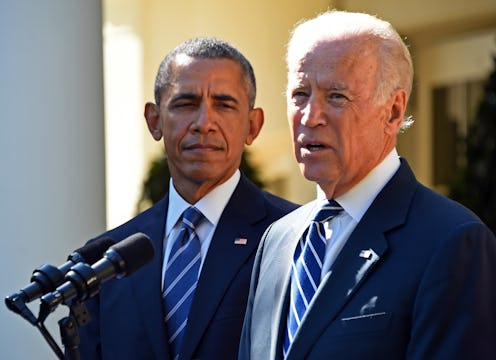News
Biden Opts Not To Run, But Why?
On Wednesday afternoon, in a dramatic and long-anticipated announcement delivered from the White House Rose Garden, Vice President Joe Biden made it official: He's not running for president in 2016. It brings his very visible and public decision-making process to an end. And to hear him tell it, it may have ultimately been a matter of time — he revealed his decision by admitting that the "window" for him to mount a serious presidential run "has closed." So why didn't Joe Biden run for president?
There are plenty of good reasons, both practical and personal. Biden touched on one of the most prominent ones at the very start of his announcement: His son Beau passed away from brain cancer complications back in May. It was a horrible personal tragedy that left Biden and his family to endure the grieving process, all while presidential speculation was swirling. In announcing that he'd decided not to run, with his wife Jill and President Obama flanking him, Biden acknowledged that, while his family feels ready to take on the challenge of a campaign, he realized that the time to run had already come and gone:
As my family and I have worked through the grieving process, I've said all along what I've said time and again to others, that it may very well be that the process by the time we get through it closes the window. I've concluded it has closed.
There’s another very good reason Biden may have decided to pass on 2016, though. And it has everything to do with pragmatism, realism, and his enduring political legacy. Simply put, on the basis of current polls and projections, and the likely impact Biden would’ve had on what’s now a two-way race between Democratic frontrunner Hillary Clinton and hard-charging underdog Bernie Sanders, it’s highly unlikely that he would’ve won the nomination.
Getting into a presidential race as a young up-and-comer to generate some attention and familiarity might’ve been one thing. But Biden is 73 now, and will be 74 on election day. He’s well past the point in his career where anything but a legitimate shot to win is worth enduring another national campaign.
And although Biden's prospects have been boosted by his years in the White House, the last time he ran for president, it went pretty disastrously. He ultimately dropped out of the 2008 race after winning less than one percent of the vote in the Iowa caucus. Frankly, his influence and political legacy can only benefit by his not running. Now, he’ll be remembered for his statesmanlike tenure as VP, rather than for a potentially protracted, divisive primary contest. Simply put, as disappointed as a lot of people are, this was the right decision for Biden ― both personally and politically.
